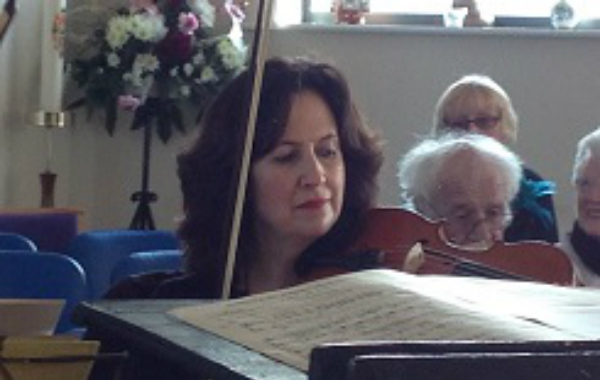
A few months ago I was on a late train back to Manchester.
I could see from my watch that the train was delayed. And I could see from other passenger's body language (shrugs, sighs and frantic texting on their phone) that there had been announcements. But I couldn't hear them.
I waited near the door. The train slowed. It was dark outside. I couldn't see where we were. So I asked the young man also standing there if he could hear the announcement. No response. I tried a bit louder. No response. Then I waved my hand a little. He looked up, slightly startled, then removed his ear buds. I couldn't resist, I said 'Oh, sorry, I see you are temporarily deaf too...' He looked confused. I know the feeling.
At least I think I do.
I play in a local amateur orchestra. Before I became deaf music made up most of my social life and was briefly my job.
Sometimes people ask how I manage. I try to explain that in fact having a script (the music) in front of you and having someone visually keeping you in time (the conductor) is a lot easier than conversation which is unpredictable and spontaneous. With a page of notes in front of you, you have a fighting chance of keeping in time with others; in a room full of people talking, those chances diminish a lot.
I was in a rehearsal the other evening. Everything was fine. We were all playing along. Then we were told to stop. And I had my usual moment of slight panic – where would we re-start? My orchestra is open, friendly and helpful, so someone – often the fantastic conductor, Barry Sugden – takes trouble to ensure I know where we are going from. But I was struck by how, when the music stops, the problems start. And this felt like a metaphor more generally. Deafened people, in particular those who prefer to lipread English rather than perhaps sign language, can be fine for a while in social situations, but then a change of subject or an unexplained in joke can suddenly isolate us completely.
Is this inevitable?
To an extent, deafness will always mean being a slight outsider. And trying to 'get' 100% of a conversation is not something even people with full hearing usually do. They filter and select the interesting bits. The problem if you are deaf is that you cannot filter. You may get odd words which are useless such as 'and' or 'well' and are not important words. But the up side is that if you take a positive attitude, you can use the extra skills you develop (acute awareness of those around you, observation of non-verbal clues) to bring more to the party.
In the case of the rehearsal, all it takes is one person ready to repeat the cue, point to the relevant bar in the music or use gesture to show what is happening. That single action makes a huge difference.
If you are still reading this you may be wondering, 'What can I do?' It's Deaf Awareness week starting soon after this blog goes to press, so to celebrate, here are 6 simple tips you can use which could help make the difference between a deaf person feeling excluded or feeling good:
- If you call someone from behind and they don't respond, don't assume they are being rude. Be aware that they may be deaf and establish eye contact before repeating your message.
- If someone tells you they are hard of hearing, deaf or a lipreader, don't be embarrassed or say ͚sorry. Try smiling then asking how you could help communication.
- Try a bit of empathy. Look in the mirror at home and speak to yourself silently. How is it?
- Don't underestimate the power of gesture. A simple clear gesture and the right facial expression can convey a lot more than an un lip-readable word repeated.
- Teach yourself and family members the finger alphabet. Often just giving the first letter of a word is enough of a clue for a deaf person to understand.
- Learn some simple BSL (British Sign Language) signs. It's enjoyable and may inspire you to go further.
There are free materials on finger spelling and basic BSL phrases on SignHealth's website.
Read more about Deafness.